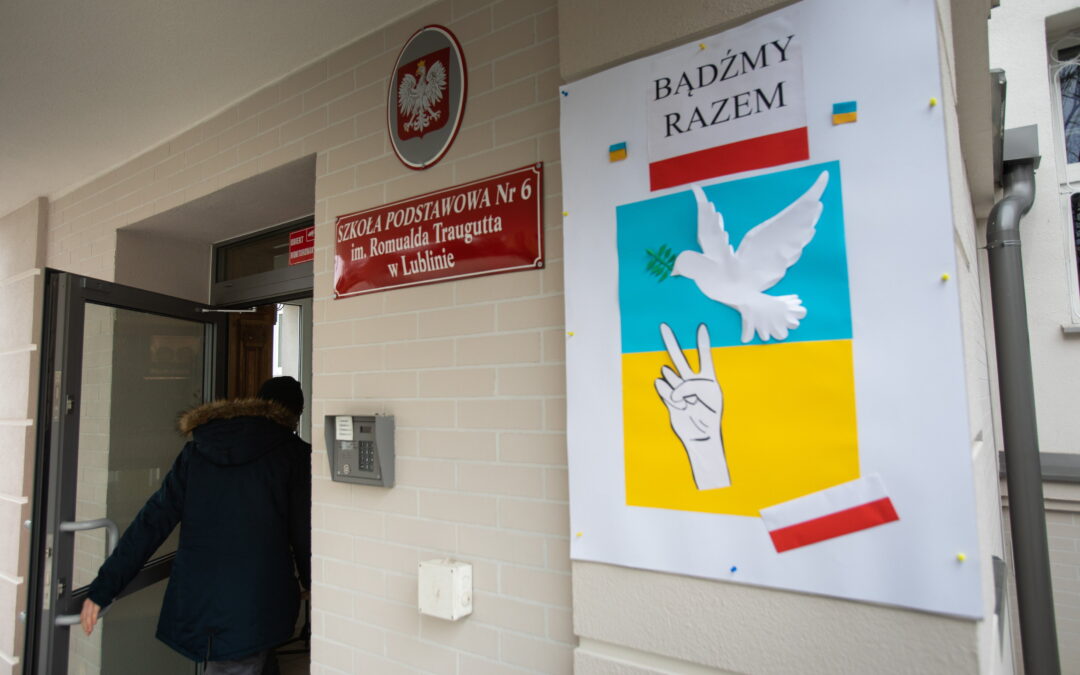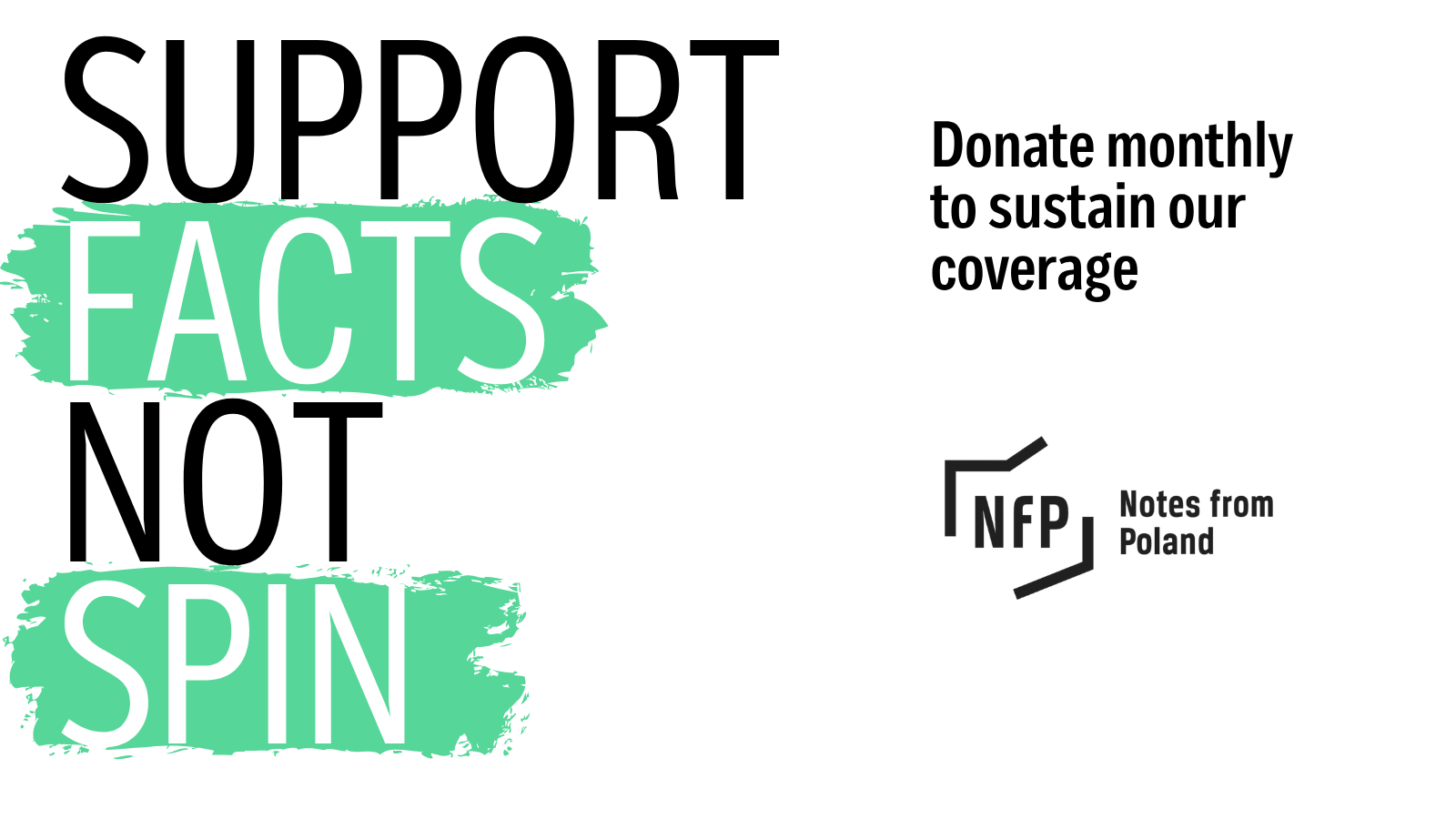Keep our news free from ads and paywalls by making a donation to support our work!

Notes from Poland is run by a small editorial team and is published by an independent, non-profit foundation that is funded through donations from our readers. We cannot do what we do without your support.
Far-right group Confederation (Konfederacja) has criticised the fact that, from this school year, students will be able to take Ukrainian as a foreign language in Poland’s high-school leaving exams, known as matura.
They claim that this gives an unfair advantage to Ukrainian pupils, who will easily be able to obtain a high grade in the subject, helping them to get a good university place. Confederation also warns that the move “supports a multicultural model that has failed in all western European countries”.
The matura is taken by most students finishing high school, and is required for those seeking to study at university. Three subjects are compulsory: Polish, mathematics and a foreign language. Students must also take an exam in at least one “extended level” subject of their choice.
Currently, for the compulsory foreign language, there are six options: English, French, Spanish, German, Russian and Italian. Individual schools can decide which of those languages to offer. From this school year, Ukrainian has been added to that list.
That has drawn the ire of the far-right Confederation (Konfederacja) group, which has 16 MPs and is currently riding high in the polls, with support of around 13%.
Confederation has long campaigned against what it claims are “privileges” being granted to Ukrainians, who are by far Poland’s largest immigrant group, numbering around 1.5 million. In a social media post, Confederation argued that the new Ukrainian matura exam is “a continuation of the privileging of Ukrainians”.
Confederation says that, because Ukrainian students will be able to easily obtain good grades for a “foreign language” that is actually their native tongue, they will be unfarily advantaged over their Polish peers when applying to universities.
They note that, because around 200,000 Ukrainian children attend Polish schools, “we are talking about tens of thousands of students each year who will have a privileged position when applying to universities”.
In addition, Confederation argues that the situation shows that “the state is abandoning its assimilationist policy, [and instead] supporting a multicultural model that has failed in all western European countries”.
“This decision is part of a broader trend that creates favourable conditions for Ukrainians to live in Poland and build an alternative society,” they added. “Ukrainian is ubiquitous in shops, adverts, public offices, and now even in schools. This is a fundamental mistake, one that future generations of Poles will pay for!”
"We cannot allow Ukrainians" – Poland's largest immigrant group – "to have representation in parliament," warns far-right leader Sławomir Mentzen.
His remarks come amid discussion over toughening the criteria for foreigners to obtain Polish citizenship https://t.co/y86IbrfpcT
— Notes from Poland 🇵🇱 (@notesfrompoland) October 7, 2025
However, whereas in their statement, Confederation said that the current education minister, Barbara Nowacka, has introduced the Ukrainian matura exam, the decision was in fact made in 2023 under the former national-conservative Law and Justice (PiS) government.
The education minister at the time, Przemysław Czarnek, issued regulations that added Ukrainian to the list of possible second languages at matura from the 2025/26 school year.
“The large influx of Ukrainian citizens to Poland due to military operations in that country’s territory may have an impact on Poles’ greater interest in that country, its language, and culture,” read the justification for the decision at the time.
PiS subsequently lost power at the end of 2023 and now sits in opposition alongside Confederation. Poland is now ruled by a more liberal coalition, ranging from left to centre-right, led by Prime Minister Donald Tusk
Only 20,000 new Ukrainian refugee children started attending Polish schools last month after enrollment became compulsory in order to receive benefits.
That was far lower than government estimates that the figure would be 60,000 to 80,000 https://t.co/c9ER7QT2DK
— Notes from Poland 🇵🇱 (@notesfrompoland) October 8, 2024
Earlier this year, Nowacka told parliament that it would be up to individual school principals to decide, in consultation with parents and teachers, whether to offer Ukrainian as a foreign language in the matura exams.
Her ministry also denied claims, spread by some Confederation politicians, that there are plans to introduce the language in the primary-school leaving exams, which students take when they are around 14 years old, or to offer incentives for principals to teach Ukrainian as a second language in their schools.
Recent months have seen growing calls for measures to limit support for Ukrainians in Poland. Opposition-aligned President Karol Nawrocki pushed the government to make child benefits for Ukrainian refugees conditional upon them being in employment.
Earlier this month, one of Confederation’s leaders, Sławomir Mentzen – who finished third in May’s presidential election with 15% of the vote – warned that Poland “cannot allow” Ukrainians to have representation in parliament because they will pursue their own interests at the expense of Poland’s.
🚨STOP DEZINFORMACJI! Wbrew fake newsom @MEN_GOVPL nie planowało i nie planuje dodawać języka ukraińskiego do listy języków na egzaminie ósmoklasisty, czy wspierać ani odgórnie wprowadzać języka ukraińskiego jako tzw. drugiego języka obcego w polskich szkołach.
Sprawdzajcie… pic.twitter.com/FU9YRuinvg— Barbara Nowacka (@barbaraanowacka) June 18, 2025

Notes from Poland is run by a small editorial team and published by an independent, non-profit foundation that is funded through donations from our readers. We cannot do what we do without your support.
Main image credit: Jakub Orzechowski / Agencja Wyborcza.pl

Daniel Tilles is editor-in-chief of Notes from Poland. He has written on Polish affairs for a wide range of publications, including Foreign Policy, POLITICO Europe, EUobserver and Dziennik Gazeta Prawna.




















